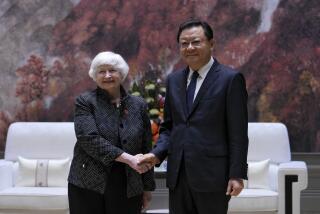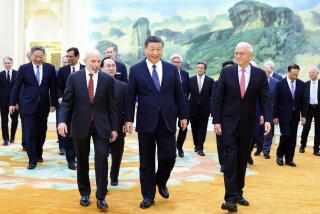Chinese investors pour more money into U.S. businesses than ever before
Chinese investments in U.S. businesses hit a record $15 billion last year, with California remaining a top destination, but the money increasingly is being spread throughout the nation as investors expand their spending into hospitality, auto parts and other industries.
This year is on pace to set another record as China’s slowing economy and unsteady exchange rate have spurred investors to seek out more security and diversity abroad, according to a study that will be released Tuesday by the nonprofit National Committee on U.S.-China Relations and research firm Rhodium Group.
More than $5 billion in U.S. deals have been completed in the first three months of this year alone. The largest was Dalian Wanda Group’s $3.5-billion acquisition of Hollywood production company Legendary Entertainment, known for “The Dark Knight” and “Jurassic World,” among other movies.
While Republican presidential front-runner Donald Trump has criticized the U.S. as being on the losing end of its dealings with China, particularly on trade, the flow of money has significant benefits, the study found.
See more of our top stories on Facebook >>
China pumped $59 billion into the U.S. from 2000 through December, buying or creating more than 1,900 companies that employ 90,000 workers, according to the findings. Employment tripled in 2015 from 2012.
The report updated a detailed look at Chinese investments that was first published by the groups last year.
“In this political year, it’s hard to find positive stories about the benefits we get out of the U.S.-China relationship,” said Stephen A. Orlins, president of the National Committee on U.S.-China Relations, which promotes constructive relations between the two nations. “This is one that is pretty much positive.”
More money flowed from China to California businesses during that 15-year period — $8 billion — than to any other U.S. state, the study said. There were 452 Chinese-owned businesses in the state, employing more than 9,500 people through December.
The spending was mostly in the Los Angeles and San Francisco metropolitan areas, with investments focused on technology, renewable energy, biotechnology and real estate.
The study looks at business investment and commercial real estate purchases but does not include Chinese spending on residential real estate, which has been booming in Los Angeles, Silicon Valley and other upscale locations.
“California is a welcoming place to foreign investment,” Orlins said. “It’s a very diverse environment.”
Last year, however, New York’s $4.1 billion in Chinese investment topped California’s $1.8 billion for the most of any U.S. state, the study found.
New York was boosted by several large commercial real estate transactions, including Anbang Insurance Group Co.’s $2-billion purchase of Manhattan’s Waldorf-Astoria Hotel.
Anbang continued its buying spree this year with a deal to purchase Strategic Hotels & Resorts Inc., which owns the Hotel del Coronado near San Diego and other posh properties, for $6.5 billion.
Last month, Anbang and a consortium of investors made a $15-billion bid for Starwood Hotels & Resorts Worldwide Inc., which owns the Westin and Sheraton brands. But Anbang abruptly dropped the offer a couple of weeks later amid a potential bidding war with Marriott International Inc.
Rhodium Group estimated Chinese firms last year invested nearly $3 billion in New York real estate, compared with about $1 billion in California.
SIGN UP for the free California Inc. business newsletter >>
Steve Collins, president of capital markets for real estate firm Jones Lang LaSalle, said it’s not surprising that investment in New York real estate has outstripped such investments in Los Angeles and San Francisco, two other markets where Chinese investors have been active.
“There’s just more real estate in New York than in L.A.,” Collins said. “There are so many opportunities to come in and play.”
Still, Collins said he expected California to remain, along with New York, a primary destination for Chinese commercial real estate investments. Firms looking for U.S. properties typically make three stops: Los Angeles, San Francisco and New York, he said.
But as more cash pours in, Collins anticipated Chinese investors will start looking beyond those cities. He’s already seen some interest in Chicago, Boston and Washington, D.C.
“They want a bite of the apple in the U.S. They feel it’s a safe and big market,” Collins said.
The geographic diversification also is being driven by a variety of new investments, Rhodium economist Thilo Hanemann said.
“Chinese investors are interested in a broader mix of industries, which is expanding their footprint from coastal urban economies to rural areas,” Hanemann said.
One reason is a desire to be closer to U.S. customers. For example, Fuyao Glass Industry Group Co., the world’s largest maker of automobile glass, purchased part of a former General Motors Co. glass plant in Moraine, Ohio, for $15 million in 2014. Then Fuyao spent $360 million to refurbish the plant to better serve auto manufacturers in North America.
Costs of labor, land and energy also can be cheaper in the Midwest and South, further fueling diversification, Hanemann said. That’s part of the reason Shandong Yuhuang Chemical Co. is spending $2 billion to build a methanol plant in Louisiana, Hanemann said.
But California remains well-positioned to be a top destination in coming years for a variety of Chinese investment in the U.S., which could reach $200 billion by 2020, Hanemann said.
He cautioned against reading too much into New York overtaking California as the top state for Chinese investment last year. A big transaction, such as the Waldorf-Astoria sale, can skew one year’s numbers. In 2014, California’s $3.1 billion in Chinese investment dwarfed New York’s $710 million.
And with little Chinese investment outside of the San Francisco Bay Area and greater L.A., there is room for growth in California.
One state industry in which Chinese investors are notably absent in the state is agriculture.
Chinese firms invested about $7.4 billion in U.S. food and agriculture companies from 2000 to 2015, according to Rhodium, but mostly in the Midwest and on the East Coast. Chinese firms invested a comparatively paltry $70 million in California food and agriculture companies during that same period.
But that could soon change. Vernon Crowder, a senior analyst for Rabobank, a major lender in the Central Valley, said Chinese investors have been looking at farmland in California for years but have held off doing deals, likely because of sky-high prices.
Prices for some key California crops, including almonds and walnuts, have dropped over the last six months as production increased and the strong dollar tamped down overseas demand for the products. Chinese investors could see that as an opportunity.
“In the last six months, there seems to be more assertive interest,” Crowder said. “In California, things have been really expensive. But with lower nut prices, we may see some of those values become a little more affordable.”
MORE FROM BUSINESS
What’s next for SpaceX and the Falcon 9 rocket that landed on a barge
Sumner Redstone said to be unhappy with Paramount sale plans -- will it matter?
Despite Tesla frenzy, electric car sales are far from robust








